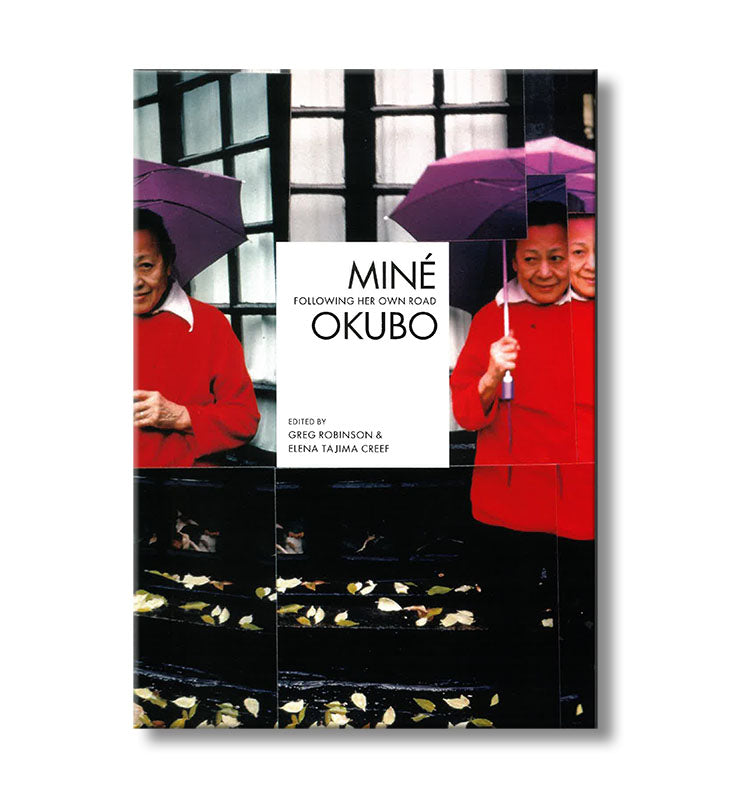Miné Okubo Following Her Own Road
SKU:151087
Couldn't load pickup availability
Product Description
Product Description
Edited by Greg Robinson and Elena Tajima Creef.
This is the first book-length critical examination of the life and work of Miné Okubo (1912-2001), a pioneering Nisei artist, writer, and social activist who repeatedly defied conventional role expectations for women and for Japanese Americans over her seventy-year career. Okubo's landmark Citizen 13660 (first published in 1946) is the first and arguably best-known autobiographical narrative of the wartime Japanese American relocation and confinement experience.
Born in Riverside, California, Okubo was incarcerated by the U.S. government during World War II, first at the Tanforan Assembly Center in California and later at the Topaz War Relocation Center in Utah. There she taught art and directed the production of a literary and art magazine. While in camp, Okubo documented her confinement experience by making hundreds of paintings and pen-and-ink sketches. These provided the material for Citizen 13660. Word of her talent spread to Fortune magazine, which hired her as an illustrator. Under the magazine's auspices, she was able to leave the camp and relocate to New York City, where she pursued her art over the next half century.
Paper: 224 pp.
Return Policy
Return Policy
UNLESS FINAL SALE:
Full refunds (less shipping and handling) will be issued provided that the merchandise is in resalable condition upon receipt and the merchandise is returned within 30 days of the delivery date. Before returning any merchandise for a refund or exchange, please email us at museumstore@janm.org. We will provide you with information necessary for the return authorization.
JANM Store Return Policy
Shipping Policy
Shipping Policy
STANDARD DELIVERY: Standard deliveries within the continental U.S. are sent via UPS Ground or USPS Priority Mail from Los Angeles, California. Delivery time varies depending on location and product availability but generally takes from 3-10 business days. You will be advised of a delay in shipping that exceeds 30 days.
JANM Store Shipping Policy
Store Pickup
Store Pickup
The JANM Store is now offering onsite pick-up for orders placed online. Just select “Pick Up in Store” at checkout. You will receive a notification email when your order is ready for pick-up.
Pick-up is by appointment only! Please reply with the date and approximate time you will be picking up your order.
We ask that you pick up your order no later than 10 days after it is ready. If your reply is not received within one week, or you cannot pick up your order within 10 days, your order may be canceled.
We DO NOT guarantee same-day pick-up. Orders received by 3:00 p.m. on a business day will usually be available for pick up by the next available pick-up date. When you arrive at the entrance to the Museum, please call the Store at 888.769.5559, and one of our Sales Associates will bring out your order.
Please allow an extra day for pick-ups on Thanksgiving weekend and the week before Christmas.
We require that you make an appointment for pick up. Appointment times are Tuesday-Saturday 12 p.m.-5 p.m.
Days and hours available for a pick up (subject to change without prior notice).
We are closed on Sundays and Mondays.
Members
Members
Membership in JANM provides numerous benefits (*including 10% off eligible JANM Store purchases!), and supports our mission to promote understanding and appreciation of America’s ethnic and cultural diversity by sharing the experiences of Japanese Americans. Become a new Member, renew your Membership, or share JANM with a friend or loved one by giving a Gift Membership.
Add a membership to your cart and you'll immediately receive 10% off all qualifying items on your order.
Join Today






